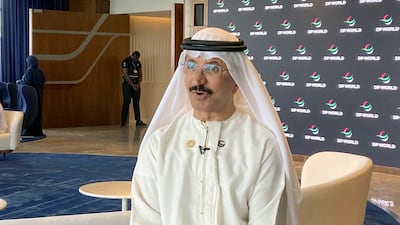Supply chain bottlenecks that disrupted global trade during the Covid-19 pandemic will linger until 2023, says Sultan bin Sulayem, chairman and chief executive of ports operator DP World.
“Short term we dealt with it, long term it will linger with us for a while,” he told CNN’s Connect The World programme at the Expo 2020 site in Dubai on Friday.
“Look at China, China is locked down. And every time there is an incident, a Covid case, a whole port will be locked down. And this will continue for a while.”
The global supply chain was in crisis at the beginning of the pandemic, the DP World chairman said in a separate interview with Bloomberg TV on Friday. “Maybe in 2023 we’ll see an easing,” he said.
The Covid-19 pandemic highlighted significant challenges in the sector, with many cargo owners struggling to find containers to move their goods to keep pace with demand and overcome labour disruptions.
Congestion at major container freight ports last month disrupted shipping operations and is leading to stagnation in global trade, Kiel Trade Indicator data shows. Bottlenecks in global shipping have increased costs and are threatening to reduce the pace of trade growth, Kiel Institute for the World Economy said.
Supply chain shortages and subsequent delays have caused the cost of shipping goods to skyrocket, Mr bin Sulayem said.
Freight rates will continue to increase and the “shipping lines are having an amazing time”, he told Bloomberg TV.
chairman and chief executive, DP World
“Today, you’re lucky to find an empty container. From $7,000, a container from the West Coast of America to China or the Far East, it’s now $30,000. These are unheard of costs, but people need products and supply chains have to fulfil it,” he told CNN.
This will lead to people questioning whether everything needs to be manufactured in the Far East, Mr bin Sulayem said.
“I believe the pandemic taught us something and gave us opportunities,” he said.
The chairman of the global ports operator, one of the world's largest, said there’s huge potential in India. “Africa continues to grow and there’s also South-east Asia, mainly Indonesia,” he said.
DP World expanded its logistics footprint in India last year by acquiring feeder and trade operators to serve fast-growing markets. Unifeeder – through its Unifeeder Indian subcontinent arm that is majority owned by DP World – acquired Transworld Feeders and Avana Logistek in 2020.
The ports operator said in July it plans to buy South Africa’s Imperial Logistics for $890 million. Its existing investments in Africa include projects in Egypt, Algeria, Djibouti, Rwanda, Somaliland, Mozambique and Senegal, according to the company’s website.

Meanwhile, Mr bin Sulayem, who is also the chairman of Virgin Hyperloop, a high-speed transport system for goods and passengers, said he is confident the technology can be implemented soon.
“It’s not decades, it’s years,” he said on the time it would take before the first passengers travel by Hyperloop.
“So I will see it either in India at first, or in Saudi Arabia at the moment. Our hope is that when we achieve economy of scale and you have longer routes and it is popular, probably for the speed of an aeroplane, you will pay with the price of a truck,” he told CNN.
DP World is the largest shareholder in the US-based Virgin Hyperloop and plans to use the system to transport cargo in the future.
“I look at this from an investment point of view as really an insurance against disruption. The biggest risk today is technology disruption. And if they are disrupted and you do anything about it, that’s a problem,” he said.


